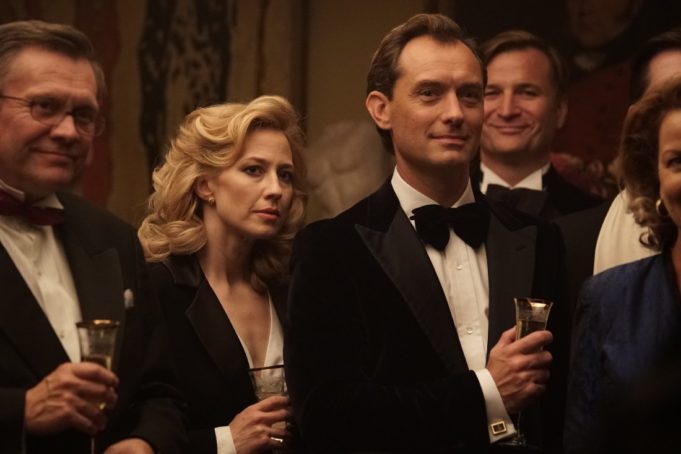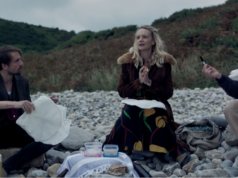We haven’t heard much from Sean Durkin since his debut feature almost a decade ago, Martha Marcy May Marlene. I could be wrong, but having watched his follow-up film The Nest, it seems to me like he’s not the sort of filmmaker who’s going to melt your face off and give you that intense visceral experience like the Safdie brothers do. Durkin prefers a gentle, nagging sense of unease instead. The Nest is similar to the Safdies’ movie from last winter, Uncut Gems, in that it’s a portrait of a capitalist operator with a hole in his soul that no amount of money will ever fill and a sense of worthlessness that no big score will ever make up for. Durkin’s film is playing in movie theaters this weekend, and while it isn’t as sexy as Uncut Gems, it seems like the more sustained and self-aware achievement.
Our striving protagonist is Rory O’Hara (Jude Law), a British commodities broker in the early 1980s who has been working in New York long enough to make his fortune, marry an American woman named Allison (Carrie Coon), and raise a teenage stepdaughter (Oona Roche) and a 10-year-old son (Charlie Shotwell) with her. With little discussion, he uproots them to the U.K. so he can go back to work for his former boss (Michael Culkin) in London, ostensibly because he sees opportunities in Mrs. Thatcher’s deregulation of Britain’s economy. You get the sense that it’s really so he can rent a huge baronial estate in Surrey, especially when he takes his family on a tour, nattering joyfully about the original 17th-century floorboards and the fact that Led Zeppelin once spent a few weeks there. His option to buy the place hinges on persuading his boss to merge his firm with an American brokerage house. Alas, the stuffy old boss submarines the deal by actually caring about what happens to his employees. What happens when that fat bonus check never comes?
The troubles that come with this aspirational move are all too neatly made metaphor in a subplot involving a show horse that Rory buys for his equestrian wife. The horse is a beautiful animal which proves sickly and unable to be brought to heel. I seriously hate everything in this movie connected to that horse. Durkin does better when he’s just dissecting this family dynamic that comes under strain because Dad is never satisfied with what he has. The mere fact that Allison feels like she has to hide her own cash from him in a box with a false bottom speaks volumes. Nor can he admit when he struggles, which leads to him being caught in a lie about his experience with London’s theater scene.
The British setting is particularly well used, as Rory feels the need to show his success to his friends and colleagues. Meanwhile, his mother (Anne Reid), living in a council flat without having heard from her son since he left for America, sees a picture of his new house and isn’t impressed. Things reach a head when Allison complains about her overly large house that she can’t pay the bills on, and Rory screams two inches from her face, “I deserve this!” Famously, Law played a man who has everything except his peace of mind in the 2004 remake of Alfie, but he’s better suited to that role here, particularly since he’s older.
All this well-heeled malaise feels like it was adapted from a midcentury novel by John Cheever or Richard Yates, but the story is all Durkin’s. In previous years, a film like this would have been given a prime awards-season release as a prestige drama. Right now, The Nest is a lean and worthy drama that is worth a trip to a socially distanced multiplex.
Starring Jude Law and Carrie Coon. Written and directed by Sean Durkin. Rated R.












